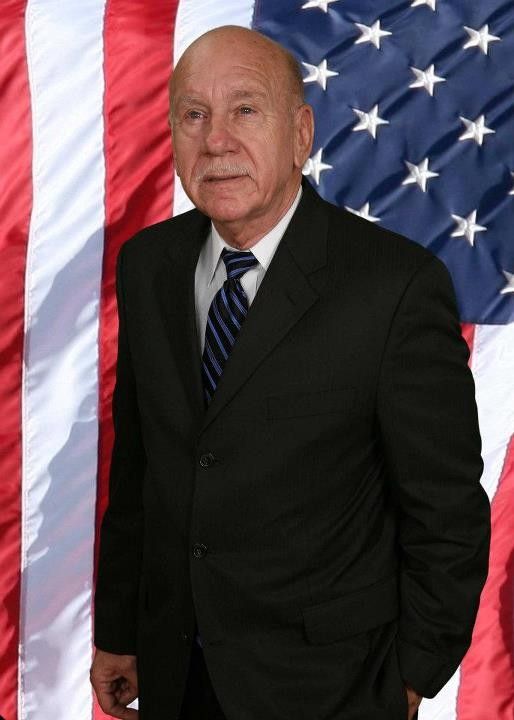Currently Florida violates three major United States constitutional issues:
Charles Frederick Tolbert EdD
Retired MSGT
Pastor
Write-in TOLBERT for
US Senate Florida 2018 NPA
CFA Citizens For America
Www.calltoduty.org
Cfa@calltoduty.org
Www.writeintolbert.com
Why are States Violating the Constitution Concerning Felon’s Right to Vote?
Ohio changed its laws allowing those who committed a felony and served their time to vote and run for office. We (State of Florida) still have charges pressed against Felons.
April 22, 2016
In 2014 while running for governor of the state of Florida, Dr. Charles Frederick Tolbert, who was a candidate for United States Senate 2016, filed grievances against Florida for violation of the U.S. and Florida Constitution.
Currently Florida violates three major United States constitutional issues:
United States Constitution says open primary. Amendment XXIV
Section 1.
The right of citizens of the United States to vote in any primary or other election for President or Vice President, for electors for President or Vice President, or for Senator or Representative in Congress, shall not be denied or abridged by the United States or any state by reason of failure to pay any poll tax or other tax.
Section 2.
The Congress shall have power to enforce this article by appropriate legislation.
United States Constitution says if one commits a felony and serves time, voting rights will be returned.
Amendment 15 Annotations fn7
Section. 1. The right of citizens of the United States to vote shall not be denied or abridged by the United States or by any State on account of race, color, or previous condition of servitude.
Section. 2. The Congress shall have power to enforce this article by appropriate legislation.
– See more at: http://constitution.findlaw.com/amendments.html#sthash.OGeDmTlF.dpuf
National Conference of State Legislatures (NCSL)
In 2009, Washington restored the right to vote to felons who completed their sentences, while requiring them to re-register to vote.
FELON VOTING RIGHTS
1/4/2016
TABLE OF CONTENTS
Background and History
Felons and Disenfranchisement
Categories of Disenfranchisement
Barriers to the Restoration of Rights
Recent State Action
The following information is provided for background information only. The National Conference of State Legislators, (NCSL) is unable to assist in or offer advice on the restoration of voting rights. We recommend that anyone interested in obtaining specific information on how to regain voting rights contact election officials in the jurisdiction where the person wishes to register and vote.
Background and History
The idea of taking away a criminal’s right to vote has been around since ancient Greece and Rome. A condition called “civil death” in Europe involved the forfeiture of property, the loss of the right to appear in court, and a prohibition on entering into contracts, as well as the loss of voting rights. Civil death was brought to America by English colonists, but most aspects of it were eventually abolished, leaving only felon disenfranchisement intact in some parts of modern America.
Felons and Disenfranchisement
According to The Sentencing Project, 5.3 million Americans (1 in 40 adults) were unable to vote due to a felony conviction in the 2008 elections. This included 1.4 million African-American men, more than 676,000 women, and 2.1 million ex-offenders who have completed their sentences.
Categories of Disenfranchisement:
State approaches to felon disenfranchisement vary tremendously. In Maine and Vermont, felons never lose their right to vote, even while they are incarcerated. In Florida, Iowa and Virginia, felons and ex-felons permanently lose their right to vote. Virginia and Florida have supplementary programs which facilitate gubernatorial pardons. The remaining states each have their own approaches to the issue.
In 38 states and the District of Columbia, most ex-felons automatically gain the right to vote upon the completion of their sentence.
In some states, ex-felons must wait for a certain period of time after the completion of their sentence before rights can be restored.
In some states, an ex-felon must apply to have voting rights restored.
Barriers to the Restoration of Rights
Even in states where ex-offenders automatically regain the right to vote upon completion of their sentence, the process of re-registering to vote often is difficult. One reason is the complexity of the laws and processes surrounding disenfranchisement. In some cases, it is difficult to determine whose rights can be restored. This can vary in some states according to the date of the crime, the conviction, or the release from prison, or the nature of the crime. The complex restoration process also can be daunting. It often involves lengthy paperwork, burdensome documentation, and the involvement and coordination of several state agencies.
A second barrier to restoration voting rights for ex-offenders is the often inconsistent communication among agencies. The methods of communicating the loss and restoration of voting rights among courts, corrections and elections officials are not always reliable, timely or consistent. This inconsistency can result in uneven application of the law, even when the laws are clear. Another barrier is lack of information. Ex-offenders sometimes are not aware that they regain their voting rights automatically upon completion of their sentence. They go through life believing they cannot vote when, in fact, they can. In other cases, they are not informed of the process for regaining their rights or offered assistance in doing so.
As long as they remain ignorant of the necessary steps, ex-offenders cannot begin the process of regaining voting rights.
A final obstacle is under-funding of parole boards in some states where offenders must apply to have their rights restored. A massive backlog of applications can exist because the agencies do not have adequate staff or resources to process them in a timely manner.
Recent State Action:
Most–though not all–recent state legislation seeks to expand felon voting rights and ease the process of restoration. Between 1996 and 2008, 28 states passed new laws on felon voting rights.
Seven repealed lifetime disenfranchisement laws, at least for some ex-offenders. Two gave probationers the right to vote.
Seven improved data-sharing procedures among state agencies.
Nine passed requirements that ex-offenders be given information and/or assistance in regaining their voting rights at the time they complete their sentence.
Twelve simplified the process for regaining voting rights, for instance, by eliminating a waiting period or streamlining the paperwork process.
Since 2008:
In 2009, Washington restored the right to vote to felons who completed their sentences, while requiring them to re-register to vote.
2011, the Florida Board of Executive Clemency (composed of the governor and three cabinet members) reversed a 2007 policy change that automatically restored voting rights to non-violent offenders upon the completion of their sentence. The new policy requires that all ex-felons wait between five and seven years before applying to regain voting rights. In Iowa, the governor in 2011 reversed an executive order issued in 2005 under the previous governor. The 2005 order automatically restored the voting rights of all ex-felons, but under the 2011 order they will now have to apply to regain rights. In Tennessee, HB 1117 was enacted, adding to the list of felons who will not be eligible to vote again.
English Is the Official Language of Florida Initiative (Article II, Section 9) {Adopted}
The Florida Constitution states English only. If then any business or major company uses English and Spanish without using the other languages it is a violation of the Florida constitution.
The English as Florida’s Official Language Amendment, on the ballot as Measure 11, was on the 1988 ballot in Florida as an initiated constitutional amendment.
Amendment 11 established English as the official state language. It was approved.
CFA Citizens For America
Charles Frederick Tolbert EdD
Retired MSGT
Pastor
Copy Editor…Vilet Dye…viletsvoice@yahoo.coM
ACTION TAKEN BY CITIZENS FOR AMERICA DR. TOLBERT
Charles Frederick Tolbert, EdD
Write-In Candidate for U.S. Senate 2016,
_______________________________/
Plaintiff,
United States District Court Northern District of Florida
v.
VERIFIED MOTION FOR SUMMARY JUDGMENT
GENERAL SUMMARY JUDGMENT ARGUMENT
1. There are no material issues of fact that need to be decided by the court in this cause.
2. The controlling Constitutional Law and Statutory Authority cited herein is such that no fact issues remain that can affect the outcome as a matter of law.
GENERAL FACTUAL ALLEGATIONS
2. Article I: “The right of citizens of the United States to vote in any primary or other election for President or Vice President, for electors for President or Vice President, or for Senator or Representative in Congress, shall not be denied or abridged by the United States or any state by reason of failure to pay any poll tax or other tax.”
Case No. 000000 Judge B. Just, State of Florida Legislature
Defendants.
Comes now before this Honorable Court the timely Motion for Summary Judgment to enter a Cease and Desist Order against The State of Florida Legislature for Violation of The United States Constitution in Illegal Election Law Legislation.
1. This Cease and Desist Motion is Serving Notice that the Two Party domination of the political system here in the State of Florida is in Violation of 24th Amendment that states:
2. The States do not have the right to choose to Close Primaries. Open Primaries is the Constitutional Law of the Land.
3. The States do not have the right of force people to join Political Parties and to pay Party Dues in order to Vote in a Primary Election. Nor do they have the right to charge Party Assessment Fees for a candidate to be able to Run for Federal Office in any Election, that is a form of Tax Collection by the State and the Respective Political Parties prohibited by The U.S. Constitution.
4. Thereby, The State of Florida, Is Hereby To Be Ordered To Cease and Desist from Conducting “Closed Primary Elections,” and is to be Further Remanded by the Court from Charging Excessive Ballot Assessment Fees (currently set at $10,440 for Party Affiliations, 6% of the annual salary, paid directly to the Major Political Parties, and $6,960 for No Party Affiliations, 4% of the annual salary, paid to the State Coffers.)
5. Or, from setting other harsh conditions, as a type of tax, with their attached Verifying Fees as stipulated for by the State of Florida in the requiring of over excessive and burdensome amounts of Signed Petitions to be gathered, currently set at 1% of a U.S. House District’s Registered Voters, (4,616 in the 4th CD FL in example;) or 119,316 Signed and Verified Petitions State-Wide for a Candidate running for U.S. Senate; which would cost $11,931.60 to verify at $.10 a petition with the County Supervisors of Elections; (that amounts to being cheaper to pay the exorbitant Ballot Assessment Fee of $10,440 demanded to be paid directly to the Political Parties, to draw a conclusion about,) in order for a Candidate’s Name to be placed on the ballot.
6. Article II: states that the Federal Congress is charged with making Federal Election Laws and Enforcing those Election Laws. It is a Federal Constitution, a Federal Election; and Federal Offices being decided, that: “Shall not be denied or abridged by a Poll Tax or Other Tax.” A condition that a citizen has to be a member of Political Party to vote in the Primary is a TAX.
7. The Key to understand here, is the wording, “or Other Tax.” In demonstration to the court of how “Illegally Contrived” Florida’s Election Laws are in Violation of The U.S. Constitution.
CONTROLLING CONSTITUTIONAL LAW
Amendment XXIV ratified to the Constitution On January 23, 1964
Section 1. The right of citizens of the United States to vote in any primary or other election for President or Vice President, for electors for President or Vice President, or for Senator or Representative in Congress, shall not be denied or abridged by the United States or any state by reason of failure to pay any poll tax or other tax.
Section 2. The Congress shall have power to enforce this article by appropriate legislation.
CONCLUSION
The courts should grant relief as may be reasonable.
Wherefore the Plaintiff moves this Honorable Court to enter an Order for Final Summary Judgment in his favor upon The Florida Legislature to Cease and Desist from its Closed Primary Elections, and to dissolve The Overly Excessive Ballot Assessment Fees and Undue Petition
Requirements for Federal Office Seekers immediately forthwith, that primary elections are open, that felons that served their time have a right to vote and that the State enforce English only and the U.S.A. and State Constitution.
2016
_________________________________ Charles Frederick Tolbert, EdD
Write-In Candidate for United States Senate Florida 2016
The White House • May 21, 2018
The Day Ahead
•
President Donald J. Trump is participating in the swearing-in ceremony for America’s new Director of the Central Intelligence Agency, Gina Haspel.
•
The President will host dinner for a group of governors to discuss the importance of secure borders, smart immigration policies, and safe communities.
President Trump supports prison reform
Crime imposes a significant burden on Americans’ well-being and taxpayer-financed resources. These costs are amplified by re-arrest rates for released American prisoners that exceed 50 percent. Many programs have been tried to reverse this trend over the past few decades. Some of them work; some don’t.
President Donald J. Trump supports prison reform legislation that builds on evidence-based programs to reduce prisoner recidivism rates. The President has called on Congress to help former inmates who have completed their sentences to have a second chance to become contributing members of society.
The White House hosted a summit on prisons last week. “Prison reform is an issue that unites people from across the political spectrum,” President Trump said. “It’s an amazing thing. Our whole nation benefits if former inmates are able to reenter society as productive, law-abiding citizens.”
Learn how President Trump wants to fix America’s prison system.
Watch: Highlights from the President’s remarks at the White House summit
Making NATO work for America-and the world
President Trump hosted NATO Secretary General Jens Stoltenberg at the White House last week. The President is continuing the legacy of transatlantic unity and is working with Secretary General Stoltenberg to ensure a successful NATO Summit this summer. President Trump also met with United Nations Secretary-General Antonio Guterres on Friday.
Sharing the defense burden continues to be a major priority. The Trump Administration is working with NATO Allies to ensure they make progress in meeting their agreed-upon defense spending commitments, which is in the interest of each NATO member individually and the alliance collectively.
Every NATO member has increased defense spending since President Trump took office. In 2017 alone, there was a boost of more than 4.8 percent in defense spending among NATO Allies, amounting to nearly $14 billion. This was the largest single-year increase in more than a quarter century.
More from President Trump’s meeting with NATO’s Secretary General
Watch: The President participates in an expanded bilateral with the Secretary General
Photo of the Day
Official White House Photo by Shealah Craighead
President Trump delivers remarks at the White House Prison Reform Summit | May 18, 2018
Privacy Policy | Contact the White House | Unsubscribe
Virus-free. www.avast.com
Www.cfabamerica.com
Www.cfabamerica.com









